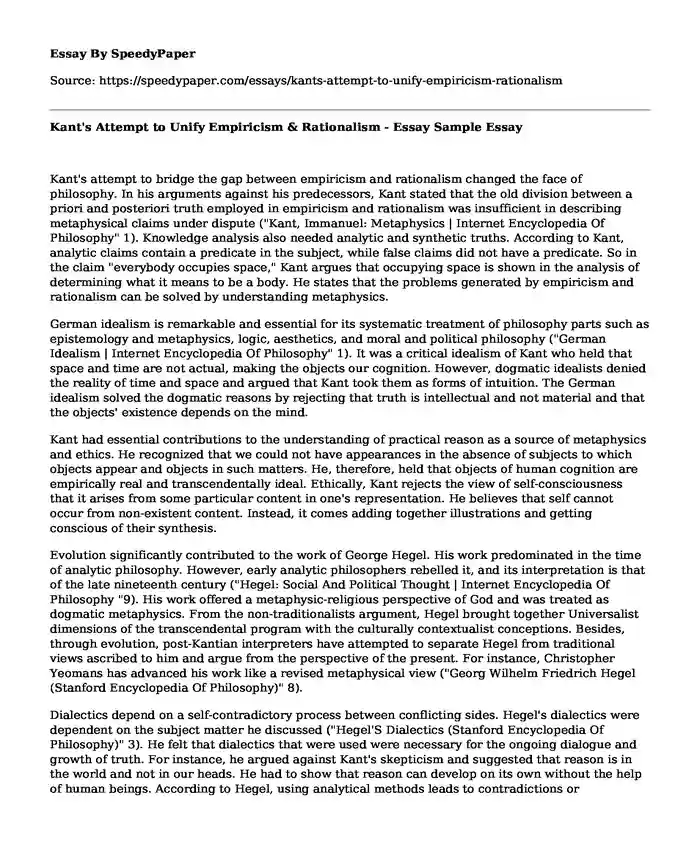
| Type of paper: | Essay |
| Categories: | Philosophy Immanuel Kant |
| Pages: | 3 |
| Wordcount: | 754 words |
Kant's attempt to bridge the gap between empiricism and rationalism changed the face of philosophy. In his arguments against his predecessors, Kant stated that the old division between a priori and posteriori truth employed in empiricism and rationalism was insufficient in describing metaphysical claims under dispute ("Kant, Immanuel: Metaphysics | Internet Encyclopedia Of Philosophy" 1). Knowledge analysis also needed analytic and synthetic truths. According to Kant, analytic claims contain a predicate in the subject, while false claims did not have a predicate. So in the claim "everybody occupies space," Kant argues that occupying space is shown in the analysis of determining what it means to be a body. He states that the problems generated by empiricism and rationalism can be solved by understanding metaphysics.
German idealism is remarkable and essential for its systematic treatment of philosophy parts such as epistemology and metaphysics, logic, aesthetics, and moral and political philosophy ("German Idealism | Internet Encyclopedia Of Philosophy" 1). It was a critical idealism of Kant who held that space and time are not actual, making the objects our cognition. However, dogmatic idealists denied the reality of time and space and argued that Kant took them as forms of intuition. The German idealism solved the dogmatic reasons by rejecting that truth is intellectual and not material and that the objects' existence depends on the mind.
Kant had essential contributions to the understanding of practical reason as a source of metaphysics and ethics. He recognized that we could not have appearances in the absence of subjects to which objects appear and objects in such matters. He, therefore, held that objects of human cognition are empirically real and transcendentally ideal. Ethically, Kant rejects the view of self-consciousness that it arises from some particular content in one's representation. He believes that self cannot occur from non-existent content. Instead, it comes adding together illustrations and getting conscious of their synthesis.
Evolution significantly contributed to the work of George Hegel. His work predominated in the time of analytic philosophy. However, early analytic philosophers rebelled it, and its interpretation is that of the late nineteenth century ("Hegel: Social And Political Thought | Internet Encyclopedia Of Philosophy "9). His work offered a metaphysic-religious perspective of God and was treated as dogmatic metaphysics. From the non-traditionalists argument, Hegel brought together Universalist dimensions of the transcendental program with the culturally contextualist conceptions. Besides, through evolution, post-Kantian interpreters have attempted to separate Hegel from traditional views ascribed to him and argue from the perspective of the present. For instance, Christopher Yeomans has advanced his work like a revised metaphysical view ("Georg Wilhelm Friedrich Hegel (Stanford Encyclopedia Of Philosophy)" 8).
Dialectics depend on a self-contradictory process between conflicting sides. Hegel's dialectics were dependent on the subject matter he discussed ("Hegel'S Dialectics (Stanford Encyclopedia Of Philosophy)" 3). He felt that dialectics that were used were necessary for the ongoing dialogue and growth of truth. For instance, he argued against Kant's skepticism and suggested that reason is in the world and not in our heads. He had to show that reason can develop on its own without the help of human beings. According to Hegel, using analytical methods leads to contradictions or oppositions, and using analytical judgments, people do not get far and anywhere at all. Hence synthetic opinions are essential to get beyond disagreements.
Hegel's philosophy holds that there is reason in history (Evans 1). This is because the world is ruled by history, so the history of the world is progressed by reason. His idea is that history conforms to a specific purpose, and God has governance and plan for the world. He has an opinion about God and a philosophical understanding of how the world's history progresses. According to him, the goal of the world's history is to continue the freedom of consciousness. He believes that history improves if there is the progress of self-consciousness through human culture in the consciousness of freedom.
Work Cited
"Georg Wilhelm Friedrich Hegel (Stanford Encyclopedia Of Philosophy)". Plato.Stanford.Edu, 2020, https://plato.stanford.edu/entries/hegel/#RevMetVieHeg.
"German Idealism | Internet Encyclopedia Of Philosophy". Iep.Utm.Edu, 2020, https://iep.utm.edu/germidea/.
"Hegel: Social And Political Thought | Internet Encyclopedia Of Philosophy". Iep.Utm.Edu, 2020, https://iep.utm.edu/hegelsoc/.
"Hegel’S Dialectics (Stanford Encyclopedia Of Philosophy)". Plato.Stanford.Edu, 2016, https://plato.stanford.edu/entries/hegel-dialectics/#WhyDoesHegeUseDial.
"Kant, Immanuel: Metaphysics | Internet Encyclopedia Of Philosophy". Iep.Utm.Edu, https://iep.utm.edu/kantmeta/.
Evans, Lawrence. "Hegel On History | Issue 129 | Philosophy Now". Philosophynow.Org, 2018, https://philosophynow.org/issues/129/Hegel_on_History.
Cite this page
Kant's Attempt to Unify Empiricism & Rationalism - Essay Sample. (2023, Oct 29). Retrieved from https://speedypaper.com/essays/kants-attempt-to-unify-empiricism-rationalism
Request Removal
If you are the original author of this essay and no longer wish to have it published on the SpeedyPaper website, please click below to request its removal:
- Free Essay Example on Pre-Socratic Philosophy
- Ancient Ethics - Essay Example in Philosophy
- Human Reasoning about Good and Evil - Essay Sample
- Essay Sample on Marxism vs. Socialism
- Essay Sample on Fredrick Douglass and Mary Wollstonecraft Similarities
- Paper Example on Berkely's Argument Against Materialism: Likeness, Objects, Anti-Abstractionism
- Socrates: Accept Fate & Embrace Death with Peace - Essay Sample
Popular categories




